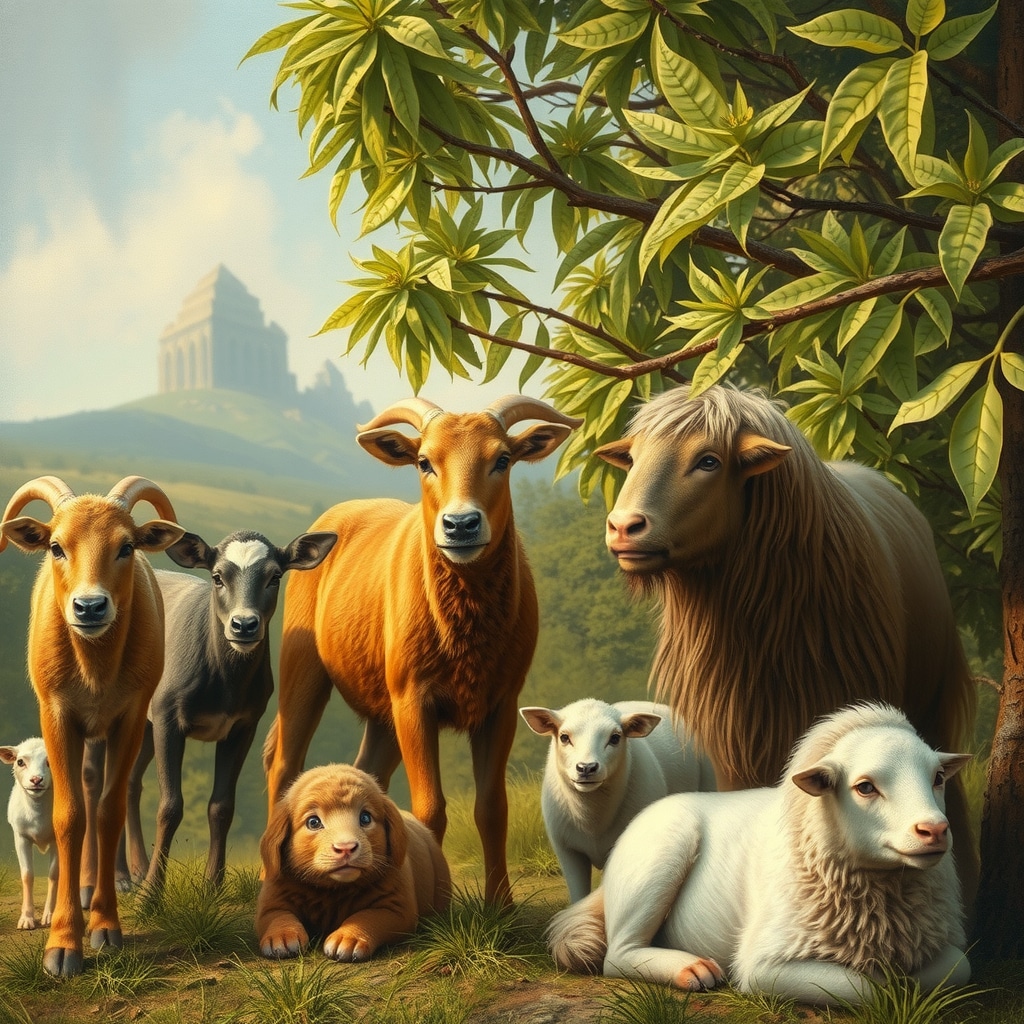
biblical meaning of animals
Table of Contents
Introduction
The Bible is rich with symbolism, and animals often serve as powerful representations of various truths and messages. Understanding the biblical meaning of animals can deepen our appreciation for scripture and enhance our spiritual journey. This article explores the significance of animals in the Bible, their symbolism, and the lessons they convey to believers today.
Animals are not merely part of the backdrop in biblical stories; they play crucial roles in conveying God’s messages, reflecting human nature, and representing the moral lessons that guide our lives. From the gentle dove to the fierce lion, each creature embodies unique attributes that resonate with readers and believers alike.
Importance of Animals in the Bible
Throughout the biblical narrative, animals play vital roles, from the creation story in Genesis to various parables and teachings of Jesus. Here are several reasons why animals hold significant importance:
- Creation Narrative: In Genesis, God creates animals and declares them good, showcasing their role in the balance of creation. This foundation highlights the idea that all of creation, including animals, serves a purpose in God’s design.
- Symbolism: Animals often symbolize different characteristics, virtues, or spiritual truths, serving as metaphors for human behavior and God’s attributes. For instance, the meekness of the lamb can symbolize humility.
- Teachings and Parables: Jesus frequently used animals in his teachings to illustrate moral lessons and convey profound spiritual truths, making the messages accessible and relatable to his audience.
- God’s Provision: Animals represent God’s provision for humanity. For instance, birds and lilies remind us of God’s care and sustenance, encouraging us to trust in His provision.
- Stewardship: The presence of animals in scripture emphasizes the human responsibility to care for God’s creation, reflecting our role as stewards of the earth.
Symbolism of Specific Animals
Each animal mentioned in the Bible carries its unique symbolism. Here are a few key examples:
The Lamb
The lamb is a potent symbol of innocence, purity, and sacrifice. In the Old Testament, lambs were used for sacrifices, pointing to the ultimate sacrifice of Jesus, the Lamb of God, in the New Testament. This connection underscores the theme of redemption and the sacrificial love of God.
The imagery of the lamb extends beyond mere sacrifice. It also signifies gentleness and humility. In John 1:29, John the Baptist refers to Jesus as “the Lamb of God, who takes away the sin of the world,” highlighting the centrality of Christ’s sacrifice in Christian faith.
The Dove
The dove represents peace, purity, and the Holy Spirit. When Noah sent out a dove after the flood, it returned with an olive branch, symbolizing hope and restoration. The dove also descended upon Jesus during his baptism, signifying the presence of the Holy Spirit and God’s approval.
Throughout biblical narratives, the dove embodies the theme of reconciliation and divine presence. In the context of the flood, it illustrates God’s promise of a new beginning and His desire for peace between Himself and humanity.
The Eagle
The eagle is often associated with strength, renewal, and God’s protection. In Isaiah 40:31, it is written that those who hope in the Lord will renew their strength and soar on wings like eagles. This imagery conveys the idea of divine empowerment and resilience.
In various passages, the eagle symbolizes God’s protective nature, likening Him to a mother eagle caring for her young. This analogy reinforces the concept of divine guardianship and the assurance of safety under God’s wings.
The Lion
The lion symbolizes strength, courage, and majesty. In the Bible, Jesus is referred to as the Lion of the Tribe of Judah, representing his royal lineage and authority. The lion’s roar also serves as a metaphor for God’s voice, powerful and commanding.
Moreover, the lion’s association with royalty and power reflects the majesty of God. In Revelation, the imagery of the lion signifies victory and sovereignty, portraying Jesus as the conquering King.
The Serpent
The serpent often symbolizes temptation, evil, and deception in the Bible. In the Garden of Eden, the serpent tempts Eve, leading to the fall of humanity. This narrative highlights the dangers of succumbing to temptation and the consequences of disobedience to God.
The portrayal of the serpent serves as a warning against moral compromise and the insidious nature of sin. It emphasizes the need for vigilance and discernment in the face of temptation.
Spiritual Significance of Animals
Beyond their symbolic meanings, animals in the Bible often reflect spiritual truths and lessons. Understanding these significances can enhance our faith:
- Dependence on God: Many animals, such as birds and lilies, are used to illustrate God’s provision. Jesus taught that if God cares for the birds of the air, how much more will He care for us? This reminds believers to trust in God’s care and provision in their lives.
- Call to Stewardship: The biblical narrative encourages humans to care for animals and the environment, highlighting our role as stewards of God’s creation. This stewardship extends beyond mere management to encompass a deep respect for all living creatures.
- Reflection of God’s Nature: The characteristics of various animals can mirror aspects of God’s nature—His gentleness, strength, and love. Observing animals can lead to deeper revelations about God’s character, inviting believers to reflect on their relationship with Him.
- Lessons in Obedience: Animals can serve as models for obedience and submission. For example, the way a lamb follows its shepherd illustrates the believer’s call to follow Christ obediently, trusting His guidance.
- Metaphors for Community: The interconnectedness of animals in their habitats can serve as a metaphor for community and the body of Christ, emphasizing the importance of each member in fulfilling God’s purpose.
Animals in Different Cultures
The symbolism of animals transcends biblical texts and resonates in various cultures around the world. Many cultures attribute spiritual significance to animals based on their characteristics. For instance:
- Native American Cultures: Animals often serve as spirit guides and symbols of various virtues, emphasizing a connection to nature and spirituality. Different tribes may regard specific animals as sacred or embodying particular traits.
- Eastern Traditions: In many Eastern philosophies, animals represent different traits and are often associated with astrology and spiritual guides. For instance, the dragon symbolizes power and authority, while the tiger embodies strength and bravery.
- Folklore and Mythology: Various cultures have folklore surrounding animals, attributing them with divine qualities or moral lessons. For instance, the fox is often depicted as cunning and clever, reflecting the dual nature of intelligence and deceit.
- Religious Symbolism: In many religions, animals are used symbolically to convey messages. For example, the ram is significant in both Jewish and Christian traditions, symbolizing sacrifice and the atonement for sin.
Conclusion
The biblical meaning of animals encompasses a rich tapestry of symbolism, spiritual significance, and moral lessons. From the gentle lamb to the majestic eagle, each creature reflects unique attributes that reveal deeper truths about God and His creation. Understanding these meanings enhances our relationship with scripture and encourages us to reflect on our own lives.
As we engage with these biblical symbols, we are reminded of our responsibility as stewards of creation and our call to live in harmony with all living beings. By recognizing the spiritual significance of animals, we can better appreciate the intricacies of God’s design and the lessons He imparts through His creation.
FAQ
1. What is the significance of animals in the Bible?
Animals in the Bible are significant as they represent various characteristics, virtues, and spiritual truths. They illustrate God’s creation, serve as metaphors in teachings, and symbolize divine attributes.
2. What does the lamb symbolize in the Bible?
The lamb symbolizes innocence, purity, and sacrifice, particularly in the context of the sacrifices made in the Old Testament and Jesus’ ultimate sacrifice as the Lamb of God.
3. How do animals reflect God’s nature?
Animals reflect God’s nature through their characteristics. For instance, the eagle symbolizes strength and renewal, while the dove represents peace and the Holy Spirit. Observing these traits can lead to deeper insights about God’s attributes.
4. Are there animals that symbolize evil in the Bible?
Yes, some animals are used symbolically to represent evil or negative traits, such as the serpent, which represents temptation and deception. Understanding these symbols helps in comprehending the moral lessons in the scriptures.
5. How can I learn more about the biblical meaning of animals?
To learn more about the biblical meaning of animals, consider reading the Bible itself, studying biblical commentaries, and exploring resources that focus on the symbolism within scripture.







